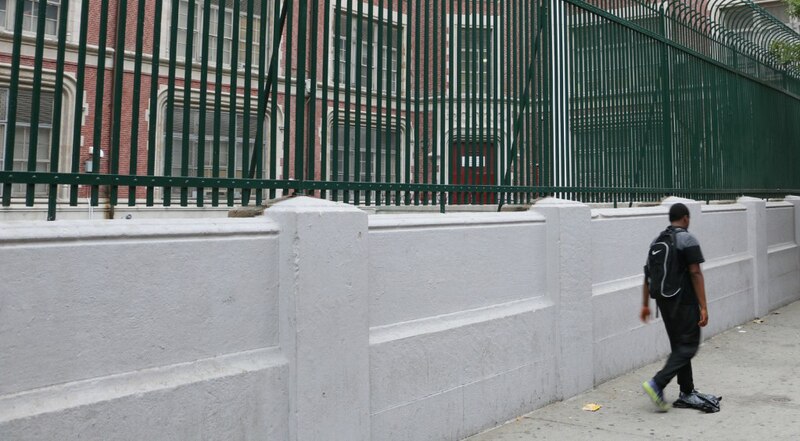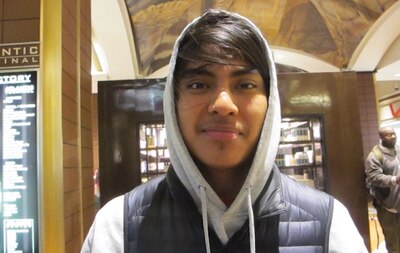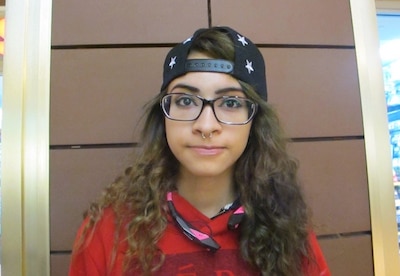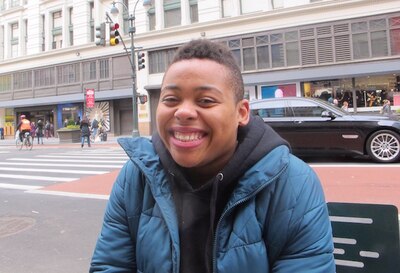
Being a teacher can be frustrating. Having a frustrated teacher can be upsetting.
Chalkbeat’s been taking a look at the ways school discipline policies play out in classrooms, and spent time asking students and teachers about moments that changed them — times they just lost their cool, or saw others lose theirs. Here are a few of those stories.

Jesus Rosas, 12th grader at a district school in Brooklyn
I was in class and we were doing group work. I was sitting in the back and my teacher came up to me and he was like, ‘What are you doing?’ And you could see on my paper that I was doing work. And he was like, ‘You haven’t done anything.’ And I was like, ‘Are you serious?’ My paper was filled. I turn the page so he could see the front and the back.
He was like, ‘You’re never doing anything. I don’t like when you sit in the back.’ So we started to get into an argument. He said, ‘Are you fucking serious?’ And I looked at him like, ‘Are you serious?’ He was looking like, ‘I can’t believe I just said that.’
To be honest, I do have this thing where I don’t let them talk to me however they want. But after he said that, I didn’t say anything because I never thought there would be a teacher that would curse at me. I’m in a leadership program so I was taught how to talk to teachers and how to be appropriate with them and he did it in front of the whole class. And everyone just looked at me and then he was just shocked he did it himself.
We didn’t have a relationship where he could talk to me like that. There are some teachers where I can talk to them like that outside of school and stuff, but I don’t have that with him.
I understand that they’re teachers and they’re more superior to me, but at the same time, it doesn’t give him and other teachers the right to talk to students like that. There are some teachers who curse at students on purpose. It’s not like they even slipped. That’s the way they try to get their point across.

Jemaralis Acevedo, 11th grader at a district high school in Brooklyn
It was in the fifth grade. I wanted to cry. We just took a math test and math is not my subject. I failed my test. I only got two questions right and the teacher started yelling at me. She called me stupid and she ripped up my paper in front of my face.
Then she pulled me out and asked me why I’m crying. And I was thinking, ‘What do you mean why am I crying?’ I told her, ‘You just embarrassed me.’ She told me that next time I should do better job and then she won’t have to embarrass me.
I didn’t want to go to school. Then I just sucked it up. It’s whatever. I had my friends who cheered me up.
[Up next: ‘No excuses’ no more? How charter schools are rethinking discipline and Beyond the viral video: Inside educators’ emotional debate about ‘no excuses’ discipline]
Talia Kovacs, literacy consultant and former charter school teacher
At the charter school I helped open, my fellow teachers, our deans, principal and all support staff worked tirelessly to put kids on the path to college. However, our professional development centered around demanding discipline as opposed to best practices in classroom management and pedagogy. This quickly got out of hand, leading to teachers focusing more on discipline than on learning.
As our leadership realized that this form of discipline was going too far, they backtracked and tried to get teachers to take a softer tone. However, many of these hardworking, professional teachers had these practices so ingrained, due to countless hours of professional development teaching us to demand silence and chastise students who spoke out, that these habits were tough to break.
I left the school because I could no longer abide getting “spoken to” when the classroom buzzed with the productive sounds of dialogue and learning, but never got “spoken to” when I raised my voice. Charters get many new teachers each year, and the message to these younger, impressionable, eager professionals is that the only way that their students will go to college is if they ensure that their hands are clasped, sounds are off and they quietly absorb information.
"The message to these younger, impressionable, eager professionals is that the only way that their students will go to college is if they ensure that their hands are clasped."
Talia Kovacs
I know for certain that every single person advocating for these discipline policies wants the best for every child in the school. However, in their quest for greatness, they forget that as humans, not all of us learn by sitting and quietly absorbing information. Certainly not in elementary school and certainly not all day.
Of course, children need structure, routine and discipline. They also need to learn by doing, experiencing, speaking, advocating. I strongly believe that most schools are working hard to find that nuance, that proper balance.
We should not condemn these charters outright. Many times, they are a much stronger alternative to a failing neighborhood school, with dedicated professionals who want the best for children. We should, however, condemn any professional development or teacher behavior that allows students who already have the odds stacked against them to feel less than, to feel that their voice doesn’t matter and to feel that they do “well” when they are taught to be quiet, hands clasped, silently obeying someone telling them what to do.
Look at the students in the video. Their non-reaction says it all.

Rachelle Mejia, 10th grader who attended a district middle school in Brooklyn
In the eighth grade I was working really hard on a project, and I was presenting. Then my teacher told me I wasn’t going to make it anywhere in life. I was going to end up on the streets.
It was my social studies teacher. I remember I had gotten my high school application and I was crying because I didn’t get into the high school I wanted to get into. And she told me, ‘That’s why you were crying. Because you’re not doing well.’ And my grades were high. They were in the 90s.
It’s affected me. You want people to be there for you and motivate you to do your best even if you do bad. It can be constructive criticism, but I felt like she wasn’t giving me constructive criticism. She was telling me that I was going to do horribly in life.
But there were students who did worse than me and other students didn’t even do the project and she didn’t say anything to them. I had always done her work. Her homework was the first thing I’d do when I got home. I always tried getting on her good side but for some reason I was always on her bad side.
Robin Aufses, director of English studies at the private Lycée Français de New York
I’m still haunted by a time — many, many years ago — when a student who seemed not to care about anyone or anything told me I had embarrassed him by saying something negative to him across a crowded room. It reminded me, and still reminds me, that the way teachers behave has an impact on students whether they show it or not. We’re still in the power position.
Generally, our good opinions of our students matter far more to them than their good opinions of us matter to us. I’ve made it my policy to always err on the side of kindness, and I’ve never regretted a kindness to a student or colleague. And as a supervisor, that’s a lesson I’ve tried to pass on to the teachers I’ve helped train.

Noelle Rose, 11th grader at a district high school in Manhattan
In seventh grade, I had a teacher who wasn’t very fond of most students. He taught social studies and English. I had a good grade in both of those classes, but one day I had a doctor’s appointment and I had told him the day before. And the day I came back, the other students were working on a project. When I asked him what I had to do so that I can catch up, he told me that I would have to ask a classmate. And then when I went to ask a classmate he told me not to speak to my classmate because they were working on their projects. So he was kind of not giving me an easy time to catch up on the project.
When we got our grades back from the project, I failed because I never got a chance to catch up. It was my first F ever, so I was really upset. He gave me my progress report, and that F ruined my entire report. And he told me to show it to my mom so that they can have a meeting. I threw it out in front of his face because I was really upset.
My high school teachers are all really friendly, and I’m able to get along with them easily. My social studies teacher and my English teacher are my favorite teachers. They’re just really open and willing to help you in a personal situation. I feel like the teacher from middle school didn’t want to have a relationship with any of the students.
Raymond Ankrum, executive director and principal at Riverhead Charter School on Long Island
"Teachers are human, and they lose their cool. But don't justify the act. "
Raymond Ankrum
I grew up in Louisiana, in a small city about 24 miles outside of New Orleans. In the 1980s, corporal punishment was still in effect. When we misbehaved, we were paddled. Honestly, it made you think twice about your actions, however, there were definitely more conventional ways to enact change. Now that I think back on it, it was rather barbaric. It was a system of control, totally unacceptable in K-12 schools.
When I saw the video (of a Success Academy teacher scolding a student), it immediately took me back there. That student should have been encouraged, and not berated. I understand that these instances occur. Teachers are human, and they lose their cool. But don’t justify the act, and don’t say you’re tired of apologizing. In this instance, you can’t apologize enough.
Hungry for more perspectives? Sign up for Chalkbeat’s morning newsletter here. Want to share your own story? Here’s an easy way to do it.
